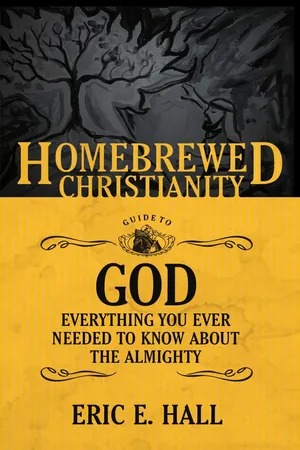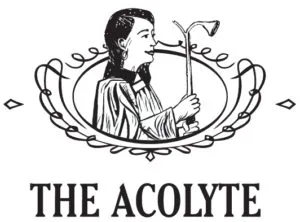We’ve talked a lot about God and concepts of God, but we’ve not once brought up whether we actually have anything to talk about! For all we know, we may be engaging in a potentially interesting but utterly pointless conversation akin to whether minotaurs prefer ice cream or hummus. Perhaps we’ve put the cart before the unicorn, but we can certainly take the question up now by trying to decipher whether or not God exists, on what grounds God may exist, and on what grounds God may not exist.
This lattermost question is especially important. Today’s reasons for rejecting an intellectual search for God often take the form of an absurd but culturally acceptable idea I call science worship (or naturalism in philosophical and beach-going circles alike). Science worshipers bow at the idol of measurement. They pour out libations to science from the beaker and the test-tube and then offer science sweet incense on petri dishes. They sacrifice at the altar of empirical data. That is, science-worshipers tend to believe truth only ever emerges within a so-called scientific context. The problem is that science worshipers follow a false god, even if there’s none to follow.
| So do frat boys. Never mind. |
Let’s take a look at where reasonable belief in God potentially goes right, and where we culturally misdiagnose the issues at stake through science-worship. In the process, I’ll offer a serious suggestion to help science-worshiping-style atheists to find a more appropriate ground upon which to ground a real atheism, one that I’ll take up more fully in the next chapter. This real atheism represents an atheism that, I’ll confess, has certainly tempted me and will continue to do so. After all, when real issues are raised, then real questions are at stake. That becomes true of atheism once we move past science worship.
Miyagi-God’s Existence
When I was about six, I figured out the Santa hoax. As I thought through all the bits and pieces that my parents, the media, and my kindergarten peers told me, nothing added up. After all, Christmas was Jesus’s birthday, and Jesus awesomely decided to give us his presence/presents for his birthday. So I was told. Santa could’ve been delivering these presents on Jesus’s behalf, but, frankly, never once had I seen a Greek saint on the same sleigh, or even in the same picture, as a Norwegian Hippie!
I settled my query. Obviously there’s a Jesus. Obviously, then, there can be no Santa. Therefore, six-year-olds are hilarious.
Atheists tend to treat belief in God like we treat belief in Santa: fine for a child but not for any reasonable adult. If we don’t take that atheist position, then we take the only alternative that we know, the position of faith. By faith, we usually mean blind-willed belief. In this context, faith somehow has more power than does reason; and God, as a cosmic vending machine, will reward us for believing despite the fact that, rationally, we shouldn’t believe. The problem is that this whole setup is wrong, even if it tends to be the only setup that we know.
In a fundamental and very basic way, it’s not that difficult to recognize the existence of God, at least of a particular kind and under certain constraints. I’m not talking about the understandings of God that many believers and atheists share: say, the muscled Old-Man River, which is a lot more difficult to affirm. However, the beginnings of Miyagi-God—that is, God as the highest reality or God as identity itself—far from being irrational, cannot be reasonably avoided. We’ve simply socialized ourselves into thinking this belief is fundamentally difficult, or else we’ve never taken our respect for reason to its ultimate end. Probably both.
| I think I am a bit too postmodern to hear you through your confidence. Let me read some Foucault real quick and I’ll be back. |
To claim that God exists at the level I’m claiming does not presume that we’re talking about the Christian God, Jewish God, or Muslim God, nor is this the God of the average, everyday churchgoer, whose concept of God can be summed up in a sense of folk-religiosity that we’ve come to call shredded Old-Man River God. In fact, in my philosophy of God and religion course, several of my theology students have told me that in order to begin getting their minds around this idea of God, they need to separate out their spirituality from these philosophical ways of talking, which attests to how different this God is in terms of the usual ways we want to talk about God. After all, we’re talking about the God of reason, the God of the philosophers. This God grounds all truth, identity, goodness, and beauty. This God is Miyagi. On these grounds, I absolutely affirm this separation of spirituality and thought in my students on one condition: that they’re willing to revisit and revise what they think it means to be spiritual in light of the truths that emerge here philosophically.
| I can imagine that kind of advice not working well during adult education hour at church. |
Miyagi-God is absolute identity and the highest reality. Miyagi-God is an absolute stability, and under a certain condition, we have to admit that this God exists as the world’s stability. That condition emerges if we can find in our lives what’s called an unqualified truth. Don’t let the name throw you off. An unqualified truth is a truth that we must affirm under any and all circumstances, cultural or otherwise. We don’t get to add qualifiers to the statement such as “Christmas to me means eating cookies” or “in this context, you make me sick.” Unqualified truths have no qualifiers attached.
| I am guessing you scratch the word “like” out of a bunch of Miyagi-God term papers. |
A lot of philosophers talk about math as producing unqualified truths. 2 and 2 equals 4 no matter what your culture, or what planet you’re on. That’s why many of the efforts to communicate with extraterrestrials in the ’70s often included mathematical equations and music, the latter of which is just math expressed through vibration. Anyone can potentially understand math because it transcends culture, space, and time. For God, however, we can do better than a math equation in terms of asserting an unqualified truth.
For instance, we already always affirm the existence and meaningfulness of the concept of truth. I say that because, even in directly denying truth, we’re actually claiming a truth for ourselves. We’re claiming to have found the truth that truth has no existence or meaning. In our denial of the existence of truth, we actually affirm another truth! Frankly, that point is unqualified in the same way that 2 and 2 make 4: under any circumstance, we must admit that there is something like truth.
That point may seem unconvincing at first, but try leveling some arguments against my portrayal of the truth of truth. Here are a few common ones. I can take a sociological stance and argue that I’ve simply been socialized into thinking that such a truth exists. I respond that the accuser must then believe himself to be socialized into thinking he’s correct, unless he’s willing to give his position an air of truth. Such a willingness would merely bring the critic back to my original claim: that we affirm that truth as such exists in an unqualified manner, even if we have nothing other than this one truth.
Or take the semantic rejection. A critic can claim that I’m merely stringing a series of words together, but it would be foolish to think that words have anything to do with reality. Words are just words, ways of expressing ourselves, and perhaps our preferences, but never truths. No doubt, my new accuser does the same as the last: she thinks that she knows something real about language in her language, but then denies that anyone else can know anything true through language. I hope you see the issue.
Or finally, some science-worshiping philosophers take something like a biological-evolutionary argument. Words, ideas, concepts, and beliefs all evolve for the sake of our survival but not with a sense of truth in mind. We may believe we have the truth, but we don’t: we have instinct, they would argue. No doubt, however, this science-worshiping critic doesn’t believe that his words about evolution are merely a matter of survival but convey something true. This critic can’t have his cake and eat it too: either our words and beliefs gain us truth, or they gain us some useful ideas helpful for surviving but gaining us truth, at best, by accident. This critic comes to the truths of the evolutionary rationale because they’re useful for survival, but the critic can never know them to be true, only helpful.
| If you weren’t Catholic I would be expecting a John 14:6 reference next. #IAMtheWAY |
I could produce a number of other examples on this list, but the crux of the claim that the truth of truth is unqualified rests on a particular understanding of truth, which means the correspondence or correctness between the way we conceive of something and the way that something works out in reality. Truth is a correspondence between thought and being. To the degree that we talk and intend to discuss anything of substance, we’re always at least partially talking about reality, even when we talk about our words, which are themselves very real. We cannot get out of this affirmation without affirming something else we think is correct in its place.
What I want to convey is that from this complicated set of thoughts, we can affirm Miyagi-God. After all, we defined Miyagi as the absolute stability point undergirding all things, the pulsating identity that allows all things to be. If truth is the correspondence between our concepts and reality, and if we can produce an unqualified truth, Miyagi, as this stability point, is necessary to affirm this absolutely stable and unqualified truth. An unqualified truth depends on an unqualified reality or Miyagi.
I consider myself a fallibilist, which is quite the awesome term, I know! What this means is that I’m willing to admit when I’m wrong. I don’t cling dogmatically to an idea because I need the idea. I’m willing to revise ideas in light of better ones, knowing the limitations of my own thinking. In this way, I don’t need to show that God exists for any personal reason. I don’t think this knowledge will “save” anyone, and I won’t get credit for it in heaven. In some ways, showing this only makes my life harder as a theologian, which is especially true in the context of what we’ll call the problem of evil and the question of whether we should care about this God. I simply think it’s true that we can affirm in a very limited way God’s existence, and I’ve come to assent to this belief on a very peculiar ground: I’m fallibilistic about my fallibilism. Even though I’m inclined to believe in the limitations of knowledge, I’ve also come to accept on fallibilistic grounds that there are some ideas that absolutely depend on the existence of Miyagi. In this way, I refuse to engage a falsely humble and pretentious disavowal of the possibility of this kind of knowledge, which persons oftentimes use to attempt to move beyond this form of argumentation.
| I think there should be a spiritual discipline called cultivating conscious fallibilism. It would significantly detoxify my facebook feed. |
Some of the other reasons for ignoring this type of argument are less honest and more annoying. People often like to ask three silly questions that they believe make them sound skeptically intelligent when arguing against the possibility of reasonably arguing for God’s existence: (1) If there’s a God who creates everything, who creates God?; (2) If God can do anything, can God create a mountain that he can’t lift?; and (3) How about you give me some real, empirical proof for this crappy argument? In response to these questions, I simply say that (1) no one creates God because God is the very act...







